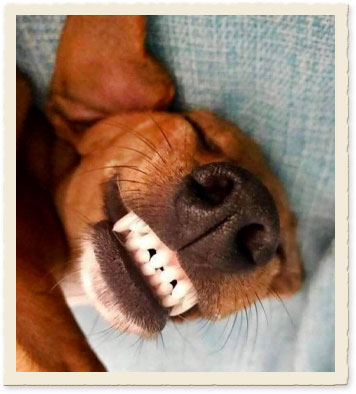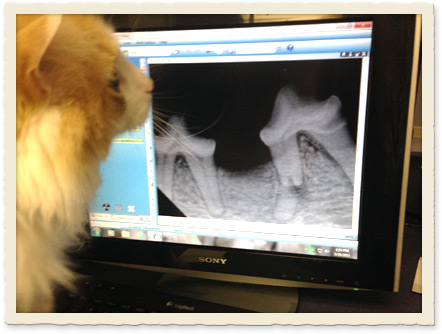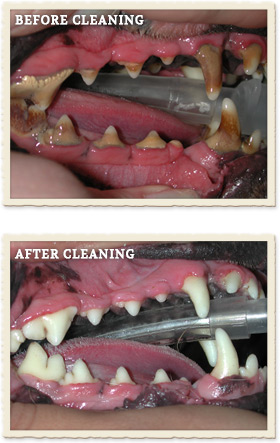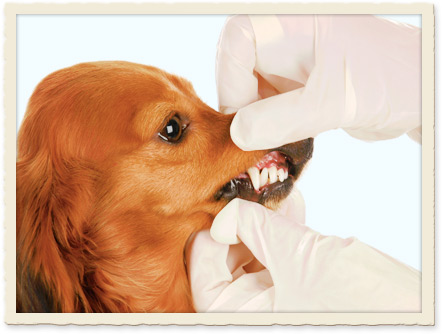Pet Dental Care
 You are a responsible pet owner and you take good care of your pet. But do you always remember to take care of your pet's teeth?
You are a responsible pet owner and you take good care of your pet. But do you always remember to take care of your pet's teeth?
Dental disease, specifically periodontal disease, is the most common ailment affecting pet dogs and cats. According to the American Veterinary Dental Society, more than 80 percent of dogs and 70 percent of cats develop gum disease by the age of three years. Periodontal disease can have a serious impact on your pet's well-being and general health.
At MapleShade Animal Hospital, we have a strong focus on dental care. Regular dental check-ups, combined with good dental hygiene at home, can increase your pet's health, vitality, and well-being and help ensure they lead the best life possible.
If left untreated, dental disease is not only painful and inhibitive of proper nutrition, but can also lead to serious systemic issues that may threaten your pet's overall health before symptoms are noticeable. For those reasons, our veterinary team strongly considers dental care an important piece of your dog's or cat's preventive health care program.
 Protecting Your Pet's Dental Health
Protecting Your Pet's Dental Health
Dental care is an essential component of preventative health care. Dr. Learman, Dr. Ballou, and the entire MapleShade staff believe that the centerpiece of good dental care is a complete oral exam followed by full mouth x-rays and tooth cleaning.
Dental x-rays are necessary for accurate evaluation and diagnosis of diseases that occur below the gum line. It has become standard of care to do full mouth radiographs during all the dental cleanings in addition to doing them prior to and after extractions. That is why MapleShade Animal Hospital includes them with all of our dental cleaning at no additional charge.
 At MapleShade Animal Hospital, your pet's dental appointment includes:
At MapleShade Animal Hospital, your pet's dental appointment includes:
- Oral examinations under anesthesia
- Full mouth x-rays
- Supra and subgingival scaling
- Tooth extractions when necessary
- Polishing
- Irrigation
- Fluoride application
We are experienced dental practitioners and are capable of offering a number of dental procedures and oral surgeries at competitive prices.
Caring for Your Pet's Teeth and Gums at Home
You can prevent serious dental problems by making sure your pet receives dental exams at the time of each vaccination, again at 6 months of age, and then annually. In between visits to your veterinarian at MapleShade Animal Hospital, check your pet's teeth regularly for signs of problems. Brushing your pet's teeth is the single most important procedure you can do to maintain good oral health. If performed regularly, brushing dramatically decreases the incidence of gingivitis and can increase the interval between teeth cleaning appointments.
If you are unsure of how to brush your pet's teeth, please ask a staff member at MapleShade Animal Hospital for instructions.
Signs of Pet Dental Problems
Halitosis, or bad breath, is the most common sign of dental disease. Classic "doggy breath" is not necessarily normal. The major cause of halitosis is periodontal disease. This is an infection of the gums and potentially the other supporting structures of the teeth. Plaque builds up every day on the tooth surface, including at the gum line.
 Left in place, the plaque can mineralize, or harden, in less than two days, forming calculus or tartar. The continued buildup of tartar both above and below the gum line can eventually produce an environment for certain types of bacteria that may be more destructive to the periodontal tissues and produce a more noticeable odor.
Left in place, the plaque can mineralize, or harden, in less than two days, forming calculus or tartar. The continued buildup of tartar both above and below the gum line can eventually produce an environment for certain types of bacteria that may be more destructive to the periodontal tissues and produce a more noticeable odor.
Other symptoms of dental disease include:
- A yellowish-brown crust of plaque on the teeth near the gum line
- Red and swollen gums
- Pain or bleeding when your pet eats or when the mouth or gums are touched
- Decreased appetite or difficulty eating
- Loose or missing teeth
If your pet is experiencing any of the above symptoms, please call MapleShade Animal Hospital today at (703) 670-7668 for an appointment, so your pet does not need to spend any more time suffering with oral discomfort.